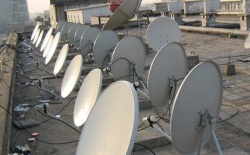“Have you changed to a dish?”的版本间的差异
来自China Digital Space
| 第7行: | 第7行: | ||
Somewhat dramatically, this practice of changing to dish TV was said to be a symbol of “resolute resistance to the forces of evil.” (“换锅子没”一词,含蓄而又坚定地表达着自己对邪恶势力勇于挑战的坚定信念。) | Somewhat dramatically, this practice of changing to dish TV was said to be a symbol of “resolute resistance to the forces of evil.” (“换锅子没”一词,含蓄而又坚定地表达着自己对邪恶势力勇于挑战的坚定信念。) | ||
| − | [[Category: | + | [[Category:Lexicon]][[Category:Society and Culture]] |
2021年2月2日 (二) 19:32的版本
Huàn guōzi méi? 换锅子没?
This phrase originated in Hengyang, Hunan. Local residents were upset about the local cable company charging unfair rates and providing poor customer service. As a result, huge numbers of people in the city installed satellite dishes to avoid dealing with the cable company. The practice of changing to satellite dish TV became so prevalent that the phrase, “Have you changed to (using) a dish” reportedly became a common greeting.
Somewhat dramatically, this practice of changing to dish TV was said to be a symbol of “resolute resistance to the forces of evil.” (“换锅子没”一词,含蓄而又坚定地表达着自己对邪恶势力勇于挑战的坚定信念。)






